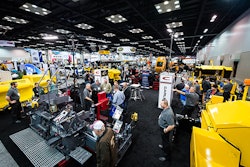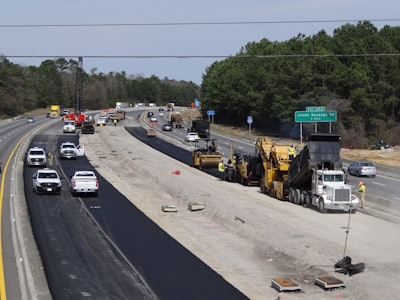
S.T. Wooten is hitting its stride on the expansion and upgrade of 13 miles of Interstate 40 between Raleigh and Clayton, North Carolina.
The Wilson-based contractor expects to complete the $360 million project in 2024, says Wooten project manager Matt Davis.
The project includes adding two lanes in each direction down the center or to the side of the highway, depending on the location. Existing concrete lanes will get an asphalt overlay. Two diverging diamond interchanges will also be constructed.
The project, which began in October 2018, hit some early delays due to right-of-way purchases for utilities, and Wooten was able to renegotiate the schedule. The N.C. Department of Transportation also added the second diverging diamond interchange into the mix, to handle the area’s rapid growth.
Wooten is also contending with material price increases and shortages, as well as labor shortages, but Davis is confident the project will remain on target. Crews are working days and nights. Including subcontractors, Davis estimates up to 400 workers are on the project.
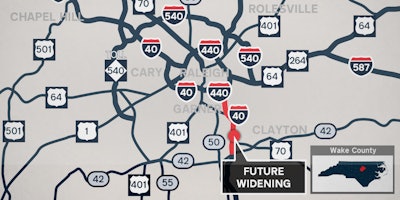 The red line shows S.T. Wooten's project area.NCDOT
The red line shows S.T. Wooten's project area.NCDOT
Dealing with traffic
The biggest challenge has been dealing with the high traffic volumes on the interstate and minimizing any traffic disruptions. Wooten came up with some innovative ways to handle the NCDOT’s hauling and lane-closure restrictions.
The company can haul materials in and out between 9 a.m. and 3 p.m. Outside those hours, it must use special accesses to the work area. Nighttime lane-closure restrictions are between 9 p.m. and early morning.
To accommodate the restrictions, Wooten built a ramp off an old bridge that will be demolished as part of the project. The bridge’s road leads to the company’s asphalt and concrete plants.
“Our trucks can travel this old bridge and then come down the ramp and be in the median and be outside of traffic,” Davis says. “That allows us to haul in the day time and have less impact to traffic.”
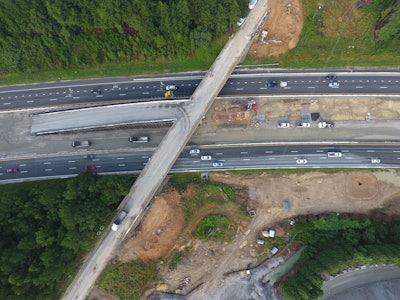 This ramp from an old bridge enables S.T. Wooten haulers to enter and exit the work area without disrupting traffic.S.T. Wooten
This ramp from an old bridge enables S.T. Wooten haulers to enter and exit the work area without disrupting traffic.S.T. Wooten
The company’s haulers also use a 1,700-foot immediate access, similar to an acceleration lane, for its trucks entering the highway, but with warning signals.
“We built it just for construction access, and we've got signs with lights and sensors, that when a truck is getting ready to pull out, the lights on the sign flash and warn drivers that somebody's about to get up to speed and merge into traffic,” he says.
For the most part, workers are behind concrete barriers between the existing east and westbound lanes. Up to 5,000 vehicles an hour zoom past.
No workers have been injured by traffic, but there are plenty of cars and trucks crashing into the barriers. “We're constantly doing repairs out here for that stuff,” Davis says.
A coordinated effort
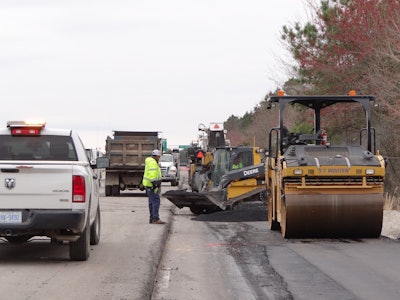 About 400 workers are out day and night in shifts on the I-40 widening project.S.T. Wooten
About 400 workers are out day and night in shifts on the I-40 widening project.S.T. Wooten
All of Wooten’s divisions are involved in the project, including bridges and structures, grading, paving, and utilities and drainage.
Wooten is doing most of the work but subbed out some grading, some of the bores and drainage, noise walls and concrete median barriers, Davis says.
The company is supplying its own concrete and asphalt, but it also supplies other customers. That, too, requires much coordination.
Material prices have increased, which has also caused some challenges. Prices for road fabric and steel and materials for signs and guardrails have been some of the most impacted. Wooten was prepared for much of that, he says.
“We went ahead and bought this stuff early on in the project, and we had it stored.”
Along with the I-40 project, Wooten is rebuilding I-95 north of Fayetteville to its connection with I-40 near Benson. The 16-mile project for widening and upgrading the interstate is expected to be completed in 2026 at a cost of $709 million.
Precise grading and paving
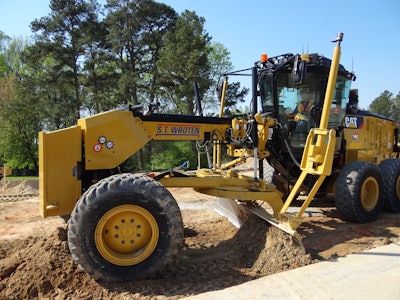 S.T. Wooten motor grader with machine controlS.T. Wooten
S.T. Wooten motor grader with machine controlS.T. Wooten
The grading is on a quarter-inch tolerance. Wooten uses machine control on its motor graders and pavers.
The project involves removing existing concrete shoulders. Wooten is crushing the milled concrete and recycling it as aggregate subgrade for the new lanes. A 12-inch layer of type 1 ABC stone will serve as the base. Another 8 inches of ABC will go on top of that, and then 13.5 inches of aspahlt will be laid for the final mainline paving.
The existing concrete road will have a 9.5-inch asphalt overlaw.
In all, the finished road will have 34.5 inches of substructure.
Diverging diamond interchanges
Originally, the project had one diverging diamond interchange planned at N.C. 42. The company will construct dual bridges as an overpass over the interstate for the interchange.
The second DDI was added later at the Jones Sausage Road intersection, near where Amazon has built a new warehouse. The additional DDI is designed to handle that increased development and traffic.
“It’s just kind of blown up as far as development, this whole area,” Davis says.
The end product
“We’re set up to finish August of 2024,” says Davis.
The interstate section's opening will be welcome news to Raleigh area commuters.
Davis likes being able to work on such an important project and the challenges it presents.
“The biggest thing for me is at the end of the day seeing that end product,” he says. “For commuters and those that live around here, this is going to be good for them and hopefully be safer for them traveling back and forth to work or wherever it may be.
“That's kind of a good feeling.”
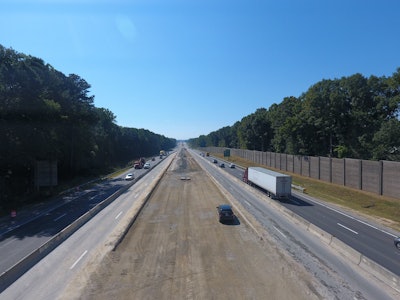 S.T. Wooten estimates an August 2024 opening for the widened I-40.S.T. Wooten
S.T. Wooten estimates an August 2024 opening for the widened I-40.S.T. Wooten


